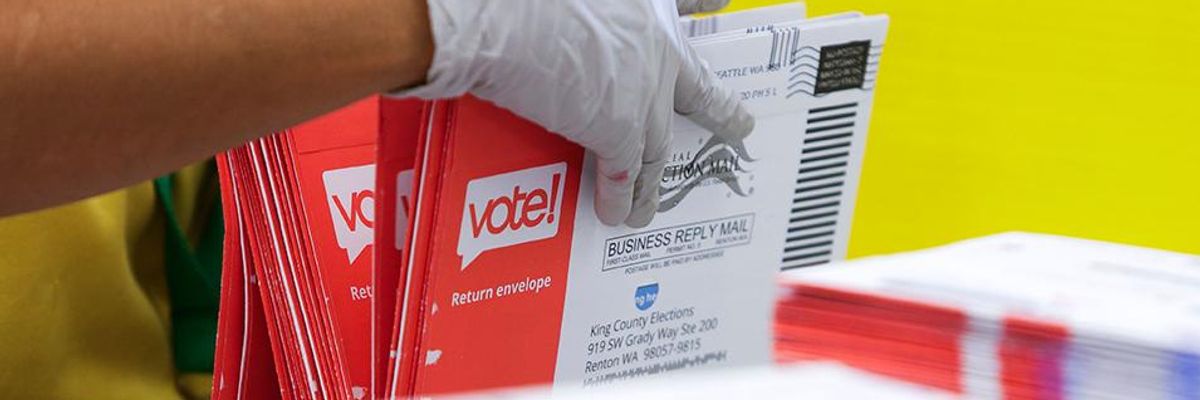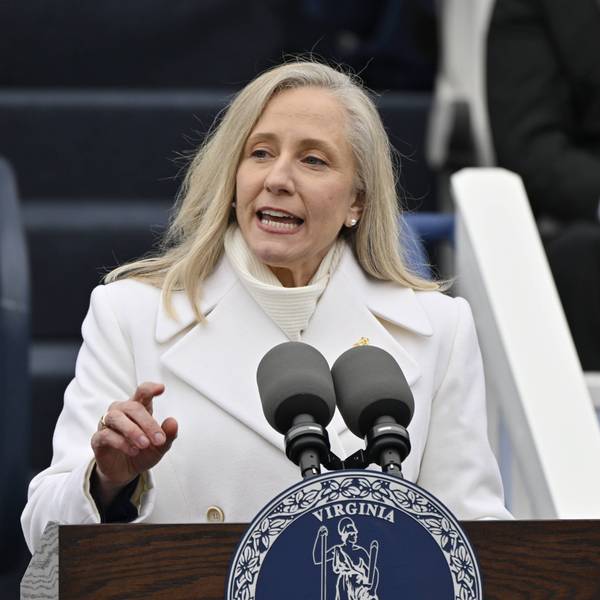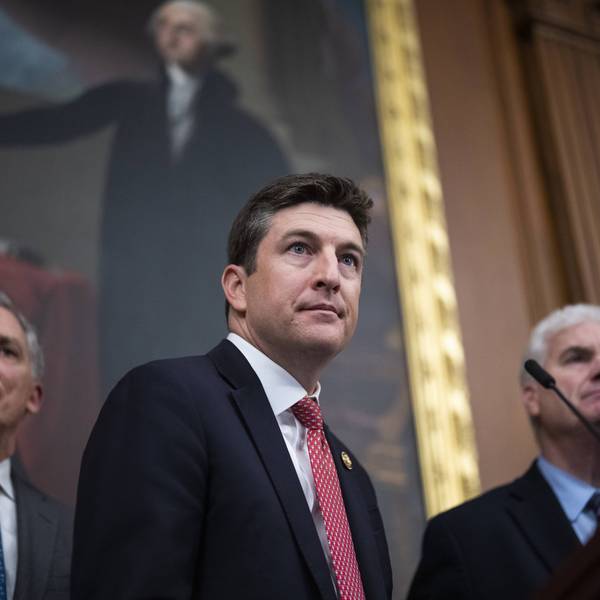
An election worker opens envelopes containing vote-by-mail ballots for the August 4 Washington state primary at King County Elections in Renton, Washington on August 3, 2020. (Photo: Jason Redmond/AFP via Getty Images)
Victory for Mail-In Voting in Tennessee as Federal Judge Rules Against GOP-Enacted State Law
"The court recognized that forcing voters to choose between voting and their health violates the Constitution."
In a win for voting rights advocates, a federal judge Wednesday temporarily blocked a Tennessee law that bars first-time voters from casting their ballots by mail unless they show identification at an election office beforehand.
"This is an important victory for Tennessee voters wishing to participate in the 2020 election that don't want to have to choose between their health and exercising their right to vote," Danielle Lang, co-director of voting rights and redistricting at Campaign Legal Center, said in a press release. "Especially during an election held during a pandemic, it is important that anybody be able to vote by absentee and mail ballot to encourage participation."
According to reporting by the Associated Press, U.S. District Judge Eli Richardson in Nashville ordered the preliminary injunction in the midst of the Covid-19 pandemic, assuring that he did so without concern "about how his decisions could aid one side or the other on the political front." The change must be in place for the November 3 general election, he said.
The Judge Richardson wrote that the state argued for its law, which plaintiffs say affected an estimated 128,000 newly registered voters last election cycle, through "a non-existent" congressional requirement and congressional intent. Tennessee has about 4.1 million registered voters.
Kristen Clarke, president and executive director of the Lawyers' Committee for Civil Rights Under Law, tweeted in celebration of the ruling Wednesday night.
Richardson, appointed to the court by President Donald Trump, had previously ruled against two other requests from plaintiffs in the lawsuit, one that dealt with distribution of absentee voting forms and another relating to the state's signature matching requirement.
"The court concludes that the requested injunction would favorably impact the public interest because as discussed above, it would serve to prevent what, based on the current record, likely would be a violation of the First Amendment right to vote enjoyed by the American citizenry," Richardson wrote.
Richardson's ruling is not the first affecting voting laws in the Volunteer State amidst the Covid-19 pandemic. According to reporting from The Tennessean:
A state court judge in June ordered that all eligible voters should have an absentee voting option during the health crisis, and that ruling was carried out during the Aug. 6 primary. However, the state kept enforcing the first-time voter requirement, which the state judge said the plaintiffs failed to bring up before her ruling.
Then the state Supreme Court overturned the absentee expansion last month, restoring the excuse-based absentee voting system and citing the state's promise--made for the first time in front of the high court--that people can vote by mail if they believe they or someone in their care face a higher risk of Covid-19 due to underlying health conditions.
"The court recognized that forcing voters to choose between voting and their health violates the Constitution," Ezra Rosenberg, co-director of the voting rights project at the Lawyers' Committee for Civil Rights Under Law, said in a statement. "This decision means that first-time voters in Tennessee who registered by mail or online--and there are tens of thousands of them, many of whom are young--can vote in November by mail, without risking their health."
An Urgent Message From Our Co-Founder
Dear Common Dreams reader, The U.S. is on a fast track to authoritarianism like nothing I've ever seen. Meanwhile, corporate news outlets are utterly capitulating to Trump, twisting their coverage to avoid drawing his ire while lining up to stuff cash in his pockets. That's why I believe that Common Dreams is doing the best and most consequential reporting that we've ever done. Our small but mighty team is a progressive reporting powerhouse, covering the news every day that the corporate media never will. Our mission has always been simple: To inform. To inspire. And to ignite change for the common good. Now here's the key piece that I want all our readers to understand: None of this would be possible without your financial support. That's not just some fundraising cliche. It's the absolute and literal truth. We don't accept corporate advertising and never will. We don't have a paywall because we don't think people should be blocked from critical news based on their ability to pay. Everything we do is funded by the donations of readers like you. Will you donate now to help power the nonprofit, independent reporting of Common Dreams? Thank you for being a vital member of our community. Together, we can keep independent journalism alive when it’s needed most. - Craig Brown, Co-founder |
In a win for voting rights advocates, a federal judge Wednesday temporarily blocked a Tennessee law that bars first-time voters from casting their ballots by mail unless they show identification at an election office beforehand.
"This is an important victory for Tennessee voters wishing to participate in the 2020 election that don't want to have to choose between their health and exercising their right to vote," Danielle Lang, co-director of voting rights and redistricting at Campaign Legal Center, said in a press release. "Especially during an election held during a pandemic, it is important that anybody be able to vote by absentee and mail ballot to encourage participation."
According to reporting by the Associated Press, U.S. District Judge Eli Richardson in Nashville ordered the preliminary injunction in the midst of the Covid-19 pandemic, assuring that he did so without concern "about how his decisions could aid one side or the other on the political front." The change must be in place for the November 3 general election, he said.
The Judge Richardson wrote that the state argued for its law, which plaintiffs say affected an estimated 128,000 newly registered voters last election cycle, through "a non-existent" congressional requirement and congressional intent. Tennessee has about 4.1 million registered voters.
Kristen Clarke, president and executive director of the Lawyers' Committee for Civil Rights Under Law, tweeted in celebration of the ruling Wednesday night.
Richardson, appointed to the court by President Donald Trump, had previously ruled against two other requests from plaintiffs in the lawsuit, one that dealt with distribution of absentee voting forms and another relating to the state's signature matching requirement.
"The court concludes that the requested injunction would favorably impact the public interest because as discussed above, it would serve to prevent what, based on the current record, likely would be a violation of the First Amendment right to vote enjoyed by the American citizenry," Richardson wrote.
Richardson's ruling is not the first affecting voting laws in the Volunteer State amidst the Covid-19 pandemic. According to reporting from The Tennessean:
A state court judge in June ordered that all eligible voters should have an absentee voting option during the health crisis, and that ruling was carried out during the Aug. 6 primary. However, the state kept enforcing the first-time voter requirement, which the state judge said the plaintiffs failed to bring up before her ruling.
Then the state Supreme Court overturned the absentee expansion last month, restoring the excuse-based absentee voting system and citing the state's promise--made for the first time in front of the high court--that people can vote by mail if they believe they or someone in their care face a higher risk of Covid-19 due to underlying health conditions.
"The court recognized that forcing voters to choose between voting and their health violates the Constitution," Ezra Rosenberg, co-director of the voting rights project at the Lawyers' Committee for Civil Rights Under Law, said in a statement. "This decision means that first-time voters in Tennessee who registered by mail or online--and there are tens of thousands of them, many of whom are young--can vote in November by mail, without risking their health."
In a win for voting rights advocates, a federal judge Wednesday temporarily blocked a Tennessee law that bars first-time voters from casting their ballots by mail unless they show identification at an election office beforehand.
"This is an important victory for Tennessee voters wishing to participate in the 2020 election that don't want to have to choose between their health and exercising their right to vote," Danielle Lang, co-director of voting rights and redistricting at Campaign Legal Center, said in a press release. "Especially during an election held during a pandemic, it is important that anybody be able to vote by absentee and mail ballot to encourage participation."
According to reporting by the Associated Press, U.S. District Judge Eli Richardson in Nashville ordered the preliminary injunction in the midst of the Covid-19 pandemic, assuring that he did so without concern "about how his decisions could aid one side or the other on the political front." The change must be in place for the November 3 general election, he said.
The Judge Richardson wrote that the state argued for its law, which plaintiffs say affected an estimated 128,000 newly registered voters last election cycle, through "a non-existent" congressional requirement and congressional intent. Tennessee has about 4.1 million registered voters.
Kristen Clarke, president and executive director of the Lawyers' Committee for Civil Rights Under Law, tweeted in celebration of the ruling Wednesday night.
Richardson, appointed to the court by President Donald Trump, had previously ruled against two other requests from plaintiffs in the lawsuit, one that dealt with distribution of absentee voting forms and another relating to the state's signature matching requirement.
"The court concludes that the requested injunction would favorably impact the public interest because as discussed above, it would serve to prevent what, based on the current record, likely would be a violation of the First Amendment right to vote enjoyed by the American citizenry," Richardson wrote.
Richardson's ruling is not the first affecting voting laws in the Volunteer State amidst the Covid-19 pandemic. According to reporting from The Tennessean:
A state court judge in June ordered that all eligible voters should have an absentee voting option during the health crisis, and that ruling was carried out during the Aug. 6 primary. However, the state kept enforcing the first-time voter requirement, which the state judge said the plaintiffs failed to bring up before her ruling.
Then the state Supreme Court overturned the absentee expansion last month, restoring the excuse-based absentee voting system and citing the state's promise--made for the first time in front of the high court--that people can vote by mail if they believe they or someone in their care face a higher risk of Covid-19 due to underlying health conditions.
"The court recognized that forcing voters to choose between voting and their health violates the Constitution," Ezra Rosenberg, co-director of the voting rights project at the Lawyers' Committee for Civil Rights Under Law, said in a statement. "This decision means that first-time voters in Tennessee who registered by mail or online--and there are tens of thousands of them, many of whom are young--can vote in November by mail, without risking their health."

